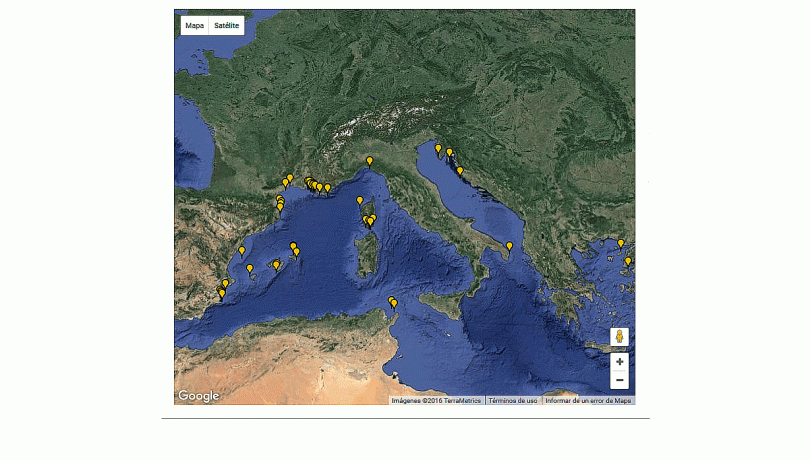The sea temperature rise is a key element closely related to the climate change. How does it happen? How does it affect marine organisms? In the Mediterranean Sea, scientists are monitoring seawater temperatures at different depths and investigating the impacts on marine ecosystems.

The sea temperature rise is a key element closely related to the climate change. How does it happen? How does it affect marine organisms? In the Mediterranean Sea, scientists are monitoring seawater temperatures at different depths and investigating the impacts on marine ecosystems.
To provide answers to these questions there is a need to compare the present situation with previous periods. For this reason, long temperature records are fundamental and oceanographers have been monitoring the seawater temperature in many stations, specially over the last 20-30 years. In the Mediterranean Sea, the longest continuous temperature series was initiated by the meteorologist Josep Pascual about 40 years ago. In September 1973, he began the systematic record of temperatures at various depths near the Medes Islands natural park (Costa Brava, NW Mediterranean). Nowadays, he has also the support of the Institut de Ciències del Mar (ICM-CSIC) and the local authority of the Parc Natural del Montgrí, les Illes Medes i el Baix Ter. The collected data reveal that temperatures have risen at an annual rate of 0,03°C at surface and around 0,02°C at 80 meters depth. Temperature data also show an early arrival of the summer conditions at the sea, namely, at around 18 hours per year. That is, roughly, one month earlier in 40 years.
“The importance of long time series is obvious in this area”, says Jordi Salat, scientist at the ICM. “In this case, the cooperation with Josep Pascual, who has been measuring the sea temperature at the same place, every week along the last 40 years, has been crucial to quantify many aspects of the evolution of the climate in the sea”.
A network for the Mediterranean Sea
In order to register temperatures all across the Mediterranean sea, the T-MEdNet network was created some years ago. It was promoted by the research group Medrecover (www.medrecover.org), involving CSIC scientists from the ICM and the Centre d’Estudis Avançats de Blanes, and from the Universitat de Barcelona. Now, T-MEdNet involves 14 research centres and institutions, as well as 11 organisms and administrations which are managing protected marine areas. It has also the support of 13 funding bodies.
Until now, more than 40 temperature measuring stations have been installed at representative measuring stations covering the Mediterranean and the Adriatic seas. Temperature is recorded every hour, with autonomous sensors, which are fixed on the rocky substrate at different depths (from 5 to 80 meters depth) in every spot. The results allow to understand temperature differences in the coastal zones, explains Joaquim Garrabou, scientist at the ICM. “These data are essential to understand the thermic conditions to which different marine communities are adapted, and to anticipate how warming could affect ecosystems in the future.” T MedNet has become an efficient tool for international collaboration. One of its strongest points is the cooperation with MedPan, the marine protected areas network (www.medpan.org). These zones, where most human activities are restricted or non permitted, are especially good places to study the effects of climatic change.
Effects on organisms
T-MedNet scientists were present in the Paris Climate Conference, in december 2015, to present the objectives and main results of the network. A relevant finding is the correlation between the rise of temperatures and the massive mortality events observed in the last decades, which have affected tenths of species and thousands of kilometers of Mediterranean coast.
Biologists are also studying the link between the sea temperature rising and the spreading of tropical species towards more temperate waters, including fish, toxic microalgae (investigated under the project OsteoRisk) and corals. Temperature changes could also play a role in the expansion of the invasive coral Oculina patagonica off the Mediterranean coasts (CSI-Coral project). Seawater warming can also affect the organisms’ metabolism, such as the sole's capacity to biotransform pollutants (as it has been found oot in the Depuramar Project).
Also, related to climate change is the progressive water acidification, which can have a particular impact on marine organisms with calcified structures such as molluscs and corals. Some studies demonstrated that these organisms calcify less when conditions are more acidic. Still, responses of the organisms may vary and exceptions can be found. As scientists saw in the MANIFEST project, deep waters corals that grow very slowly apparently are not so much affected by acidification.
Simultaneously, other scientists are studying processes that contribute to the modulation of the impacts of climate change in the planet. Examples include the role of plankton in the oceanic emission of aerosols, atmospheric particles involved in cloud formation (PEGASO and BIONUC projects), and the effects of polluted and Saharan aerosols deposition on the organisms in the water column (ADEPT project). The results of these projects are crucial for modeled projections of climate change and its effects.
The temperature stations of the T-MEdNet network.